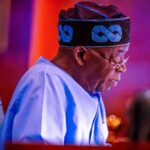In his Democracy Day speech to Nigerians last month, then Speaker of the House of Representatives, Femi Gbajabiamila, now the top presidential aide, described President Bola Ahmed Tinubu as “a product of democracy” and “a thoroughbred democrat who is noted for his tenacious defence of democracy”.
We do not question the president’s claim to democratic credentials, but those credentials are now being put to test by the public behaviour of the Department of State Services (DSS), an agency that had its origins in Nigeria’s undemocratic past. How President Tinubu responds to the DSS’s increasingly erratic, and in several instances outrightly illegal behaviour towards Nigerian laws, sister agencies and citizens will go a long way in burnishing or tarnishing the president’s reputation as a democrat.
Unlike Tinubu, the DSS is not much known as a champion of democracy. Established near the twilight of military rule, the DSS was still an infant—scarcely a decade old—when Nigeria returned to democracy in 1999. By all reasonable expectations then, the agency should have matured along with democratic norms and practices. But few will credit the DSS with such a reputation. As late as last week, legal experts, civil society organizations and the media lambasted the DSS for yet more of its undemocratic practices, the litany of which, sadly, has by now become legion.
Not once but several times in the recent past, the DSS had laid siege on the National Assembly and barred members either from accessing their chambers, or from holding sessions. It has been on several occasions accused of interfering in election matters. Its men have clashed with those of other agencies, particularly the police and the armed forces, sometimes at the real risk of agency-on-agency gun fights. The DSS has stormed or taken over buildings belonging to other government agencies, without legal warrants, in the name of conducting “investigations”.
- NAPTIP raises alarm over trafficking of girls from Mali to Nigeria
- Kadpoly alumni laud appointment of ex-Daily Trust DGE, others as spokesmen
And yet, as if in a bid to outdo its own undistinguished past, the DSS has literally run amok lately. We do not make this assertion lightly. First, we note, with concern that the DSS has conducted its activities more in the open and on the pages of newspapers than in the clandestine fashion required of an organization originally designed to be known only by its positive impact on internal security, but not to be seen or heard. This much was raised lately by many newspapers and civil society organizations in the country.
More worrisome still, the DSS has turned incompetent aggression into an operational method of sorts. In December, the Chief Judge of the Federal High Court, no less, declined, for lack of sufficient evidence, an application by the DSS to arrest and detain then Governor of the Central Bank, Mr Godwin Emefiele, in order to pursue further investigations into allegations of “terrorism financing and economic crimes” against him.
Two weeks ago, three separate judges ruled that the DSS should release Mr Emefiele or charge him to court after having detained him since 10th June. The DSS then proceeded to court, but rather than with charges for terrorism financing or other economic crimes, the agency charged Emefiele for illegal possession of firearms and ammunitions, leaving Nigerians asking, ‘what took you so long if this was all you had? Still, when a judge granted Emefiele bail for that, the DSS promptly re-arrested him for yet to be disclosed charges, never mind the public show of shame between the DSS operatives and officials of the Nigeria Correctional Service who, by law, should have custody of accused persons processing bail terms and conditions.
We are deeply concerned by how the DSS has conducted itself in public through all these proceedings. First, all of these point to incompetence for an agency that should do its homework about allegations it makes against citizens before going public with them. Otherwise, security agencies are known to secretly share classified information with legislators and judges when pursuing sensitive cases that cannot be publicly disclosed. If this be the case with Emefiele, all the DSS needs to do is to share evidence of its allegations with respective judges and pursue the case more competently in classified fashion, rather than turn itself into a laughing stock before the whole nation.
We are equally concerned because Nigeria currently faces internal security challenges from disparate collection of non-state actors, from insurgents in the northeast, to violent secessionists in the southeast, to bandits and organized criminals almost everywhere else. These are the challenges the DSS should be best equipped to help the Nigerian state deal with as a secret police outfit. But to do that requires credibility and public confidence of Nigerians, both of which are now being frittered away.
We, therefore, call on President Tinubu to call the DSS to order. A democrat must oversee institutions that are seen to be democratic.

 Join Daily Trust WhatsApp Community For Quick Access To News and Happenings Around You.
Join Daily Trust WhatsApp Community For Quick Access To News and Happenings Around You.


